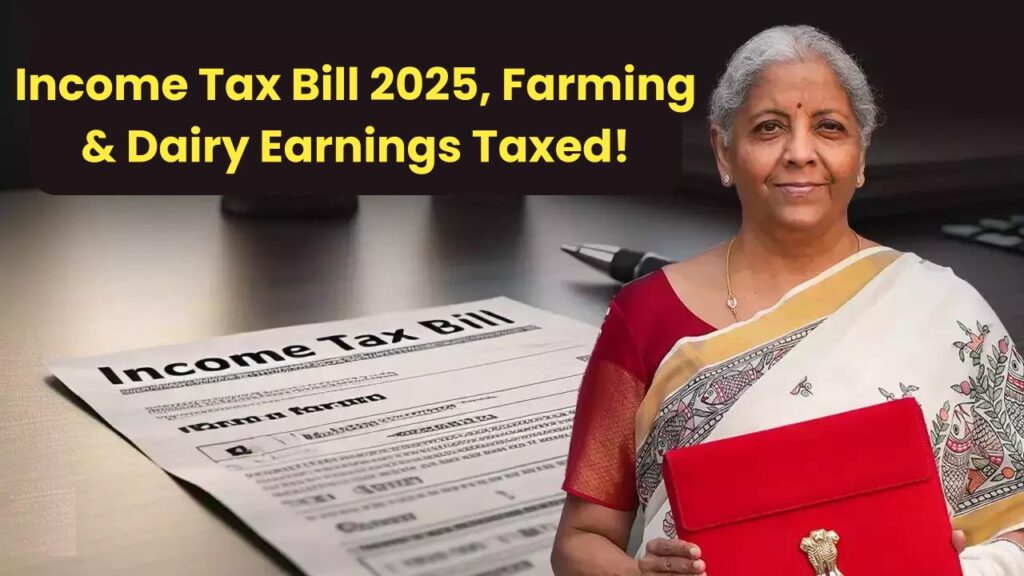
The Income Tax Bill 2025 has introduced a significant shift in India’s tax policy, aiming to bring farming and dairy earnings under the tax net. For decades, agricultural income has enjoyed tax exemptions, but the government is now revising these rules to curb misuse and improve tax compliance.
Many farmers, agricultural entrepreneurs, and dairy business owners are concerned about how this change will affect their finances. In this article, we’ll break down the new tax policies, explain their impact, and offer practical advice on how to stay compliant while maximizing deductions.
Income Tax Bill 2025
| Aspect | Details |
|---|---|
| New Tax Rule | Farming and dairy income above a certain threshold will now be taxable |
| Who is Affected? | Farmers, dairy businesses, agripreneurs, and large-scale agricultural enterprises |
| Tax Rate | Progressive taxation based on income slabs |
| Exemptions | Small farmers with earnings below the set threshold will remain tax-free |
| Implementation | Expected to be rolled out in FY 2025-26 |
| Official Source | Income Tax Department |
The Income Tax Bill 2025 introduces a historic change by taxing high-income farming and dairy earnings. While small farmers remain exempt, large agricultural enterprises must prepare for tax compliance. By maintaining proper records, using deductions, and reinvesting in agriculture, farmers can minimize their tax burden while contributing to national revenue. For more details, stay updated with Income Tax Department announcements!
Understanding the Change: Why Tax Farming & Dairy Earnings?
Historically, agricultural income has been exempt from tax to support small farmers and promote the agricultural sector. However, over the years, many high-income earners have misused this exemption by falsely classifying non-agricultural earnings as farm income.
The new bill aims to:
- Ensure fair taxation – Large-scale farmers and agribusinesses that earn substantial profits will contribute their fair share.
- Prevent tax evasion – This closes loopholes where non-farmers declare farm earnings to avoid taxes.
- Boost government revenue – Additional tax revenue will be used for agricultural development and infrastructure.
Who Will Be Taxed?
Not all farmers and dairy owners will be affected. The bill introduces income thresholds, meaning only those earning above a certain limit will need to pay taxes.
Taxable Groups:
- Large-scale corporate farms and agribusinesses
- Dairy businesses with substantial profits
- Farmers selling processed or value-added products
- Landowners leasing large tracts for commercial farming
Exempt Groups:
- Small and marginal farmers with income below the set threshold
- Families engaged in subsistence farming
- Farmers earning purely from traditional crop sales without large-scale profits
Zero Toll Tax: Government’s New Toll Tax Rule, Are You on the Exempt List?
Budget 2025: New Tax 25% Rate & Fresh Deductions — Check What’s Changing?
₹12,000 Women’s Empowerment Scheme Launched By Modi Government – Check Application Deadline & Other Important Details
How Will Agricultural Income Be Taxed?
The Income Tax Bill 2025 proposes a progressive tax system for agricultural earnings. Here’s a simplified breakdown:
| Income Slab (Annual) | Tax Rate |
| Up to ₹2.5 lakh | 0% (Exempt) |
| ₹2.5 lakh – ₹5 lakh | 5% |
| ₹5 lakh – ₹10 lakh | 10% |
| ₹10 lakh – ₹25 lakh | 20% |
| Above ₹25 lakh | 30% |
This structure ensures that only high-income agricultural businesses pay taxes, while small farmers remain exempt.
How to Calculate Taxable Farming Income?
If you’re unsure whether your earnings will be taxed, follow this simple calculation method:
- Identify Total Income – Add up your revenue from crop sales, dairy products, livestock, and agricultural services.
- Deduct Expenses – Subtract costs like seeds, fertilizers, machinery, labor wages, transportation, and marketing.
- Compute Net Profit – The final amount is your taxable income (if above ₹2.5 lakh).
- Apply Tax Slab – Use the table above to determine how much tax you owe.
Ways to Reduce Tax Liability (Legally!)
There are still several deductions and exemptions you can use to lower your tax burden. Here’s how:
- Depreciation Benefits – Machinery and farming equipment costs can be written off over time.
- Investment in Agri-Tech – Money spent on technology, irrigation, and sustainable farming qualifies for deductions.
- Reinvestment Exemptions – If profits are reinvested into agriculture, they might be tax-exempt.
- Government Subsidies – Certain subsidized projects and schemes reduce taxable income.
How to Stay Compliant?
If you’re farming or dairy income is taxable, follow these steps to avoid penalties:
✔ Maintain Proper Records – Keep track of all income, expenses, and sales receipts.
✔ File Taxes Annually – Ensure timely submission of Income Tax Returns (ITR).
✔ Consult a Tax Expert – Professional guidance can help you maximize deductions and stay compliant.
✔ Use Digital Payment Methods – Transactions through banks provide a clear record for tax authorities.
FAQs On Income Tax Bill 2025
1. Will small farmers have to pay tax?
No, farmers with an annual income below ₹2.5 lakh will remain exempt from taxes.
2. Does this apply to dairy farmers as well?
Yes, but only large-scale dairy businesses will be taxed. Small-scale dairy farmers remain exempt.
3. Can farmers claim deductions?
Yes! Expenses related to seeds, fertilizers, labor, and machinery can be deducted from taxable income.
4. Will leased farmland income be taxed?
Yes, large landowners leasing agricultural land for commercial farming will be taxed on rental income.
5. Where can I get official information?
Visit the Income Tax Department for official updates and guidelines.







